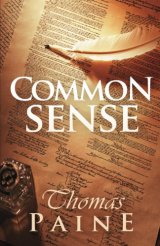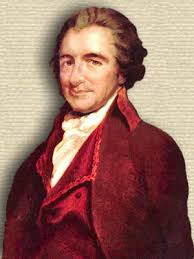Common Sense Page #7
Common Sense is a pamphlet written by Thomas Paine in 1775–1776 advocating independence from Great Britain to people in the Thirteen Colonies. Writing in clear and persuasive prose, Paine marshaled moral and political arguments to encourage common people in the Colonies to fight for egalitarian government.
But admitting, that we were all of English descent, what does it amount to? Nothing. Britain, being now an open enemy, extinguishes every other name and title: And to say that reconciliation is our duty, is truly farcical. The first king of England, of the present line (William the Conqueror) was a Frenchman, and half the Peers of England are descendants from the same country; therefore, by the same method of reasoning, England ought to be governed by France. Much hath been said of the united strength of Britain and the colonies, that in conjunction they might bid defiance to the world. But this is mere presumption; the fate of war is uncertain, neither do the expressions mean any thing; for this continent would never suffer itself to be drained of inhabitants, to support the British arms in either Asia, Africa, or Europe. Besides what have we to do with setting the world at defiance? Our plan is commerce, and that, well attended to, will secure us the peace and friendship of all Europe; because, it is the interest of all Europe to have America a free port. Her trade will always be a protection, and her barrenness of gold and silver secure her from invaders. I challenge the warmest advocate for reconciliation, to shew, a single advantage that this continent can reap, by being connected with Great Britain. I repeat the challenge, not a single advantage is derived. Our corn will fetch its price in any market in Europe, and our imported goods must be paid for buy them where we will. But the injuries and disadvantages we sustain by that connection, are without number; and our duty to mankind at large, as well as to ourselves, instruct us to renounce the alliance: Because, any submission to, or dependance on Great-Britain, tends directly to involve this continent in European wars and quarrels; and sets us at variance with nations, who would otherwise seek our friendship, and against whom, we have neither anger nor complaint. As Europe is our market for trade, we ought to form no partial connection with any part of it. It is the true interest of America to steer clear of European contentions, which she never can do, while by her dependence on Britain, she is made the make-weight in the scale of British politics. Europe is too thickly planted with kingdoms to be long at peace, and whenever a war breaks out between England and any foreign power, the trade of America goes to ruin, because of her connection with Britain. The next war may not turn out like the last, and should it not, the advocates for reconciliation now will be wishing for separation then, because, neutrality in that case, would be a safer convoy than a man of war. Every thing that is right or natural pleads for separation. The blood of the slain, the weeping voice of nature cries, 'Tis time to part. Even the distance at which the Almighty hath placed England and America, is a strong and natural proof, that the authority of the one, over the other, was never the design of Heaven. The time likewise at which the continent was discovered, adds weight to the argument, and the manner in which it was peopled encreases the force of it. The reformation was preceded by the discovery of America, as if the Almighty graciously meant to open a sanctuary to the persecuted in future years, when home should afford neither friendship nor safety. The authority of Great-Britain over this continent, is a form of government, which sooner or later must have an end: And a serious mind can draw no true pleasure by looking forward, under the painful and positive conviction, that what he calls "the present constitution" is merely temporary. As parents, we can have no joy, knowing that this government is not sufficiently lasting to ensure any thing which we may bequeath to posterity: And by a plain method of argument, as we are running the next generation into debt, we ought to do the work of it, otherwise we use them meanly and pitifully. In order to discover the line of our duty rightly, we should take our children in our hand, and fix our station a few years farther into life; that eminence will present a prospect, which a few present fears and prejudices conceal from our sight. Though I would carefully avoid giving unnecessary offence, yet I am inclined to believe, that all those who espouse the doctrine of reconciliation, may be included within the following descriptions. Interested men, who are not to be trusted; weak men, who cannot see; prejudiced men, who will not see; and a certain set of moderate men, who think better of the European world than it deserves; and this last class, by an ill-judged deliberation, will be the cause of more calamities to this continent, than all the other three. It is the good fortune of many to live distant from the scene of sorrow; the evil is not sufficient brought to their doors to make them feel the precariousness with which all American property is possessed. But let our imaginations transport us for a few moments to Boston, that seat of wretchedness will teach us wisdom, and instruct us for ever to renounce a power in whom we can have no trust. The inhabitants of that unfortunate city, who but a few months ago were in ease and affluence, have now, no other alternative than to stay and starve, or turn out to beg. Endangered by the fire of their friends if they continue within the city, and plundered by the soldiery if they leave it. In their present condition they are prisoners without the hope of redemption, and in a general attack for their relief, they would be exposed to the fury of both armies. Men of passive tempers look somewhat lightly over the offences of Britain, and, still hoping for the best, are apt to call out, "Come, come, we shall be friends again, for all this." But examine the passions and feelings of mankind, Bring the doctrine of reconciliation to the touchstone of nature, and then tell me, whether you can hereafter love, honour, and faithfully serve the power that hath carried fire and sword into your land? If you cannot do all these, then are you only deceiving yourselves, and by your delay bringing ruin upon posterity. Your future connection with Britain, whom you can neither love nor honour, will be forced and unnatural, and being formed only on the plan of present convenience, will in a little time fall into a relapse more wretched than the first. But if you say, you can still pass the violations over, then I ask, Hath your house been burnt? Hath your property been destroyed before your face? Are your wife and children destitute of a bed to lie on, or bread to live on? Have you lost a parent or a child by their hands, and yourself the ruined and wretched survivor? If you have not, then are you not a judge of those who have. But if you have, and still can shake hands with the murderers, then are you unworthy of the name of husband, father, friend, or lover, and whatever may be your rank or title in life, you have the heart of a coward, and the spirit of a sycophant.
Translation
Translate and read this book in other languages:
Select another language:
- - Select -
- 简体中文 (Chinese - Simplified)
- 繁體中文 (Chinese - Traditional)
- Español (Spanish)
- Esperanto (Esperanto)
- 日本語 (Japanese)
- Português (Portuguese)
- Deutsch (German)
- العربية (Arabic)
- Français (French)
- Русский (Russian)
- ಕನ್ನಡ (Kannada)
- 한국어 (Korean)
- עברית (Hebrew)
- Gaeilge (Irish)
- Українська (Ukrainian)
- اردو (Urdu)
- Magyar (Hungarian)
- मानक हिन्दी (Hindi)
- Indonesia (Indonesian)
- Italiano (Italian)
- தமிழ் (Tamil)
- Türkçe (Turkish)
- తెలుగు (Telugu)
- ภาษาไทย (Thai)
- Tiếng Việt (Vietnamese)
- Čeština (Czech)
- Polski (Polish)
- Bahasa Indonesia (Indonesian)
- Românește (Romanian)
- Nederlands (Dutch)
- Ελληνικά (Greek)
- Latinum (Latin)
- Svenska (Swedish)
- Dansk (Danish)
- Suomi (Finnish)
- فارسی (Persian)
- ייִדיש (Yiddish)
- հայերեն (Armenian)
- Norsk (Norwegian)
- English (English)
Citation
Use the citation below to add this book to your bibliography:
Style:MLAChicagoAPA
"Common Sense Books." Literature.com. STANDS4 LLC, 2024. Web. 25 Nov. 2024. <https://www.literature.com/book/common_sense_270>.




Discuss this Common Sense book with the community:
Report Comment
We're doing our best to make sure our content is useful, accurate and safe.
If by any chance you spot an inappropriate comment while navigating through our website please use this form to let us know, and we'll take care of it shortly.
Attachment
You need to be logged in to favorite.
Log In